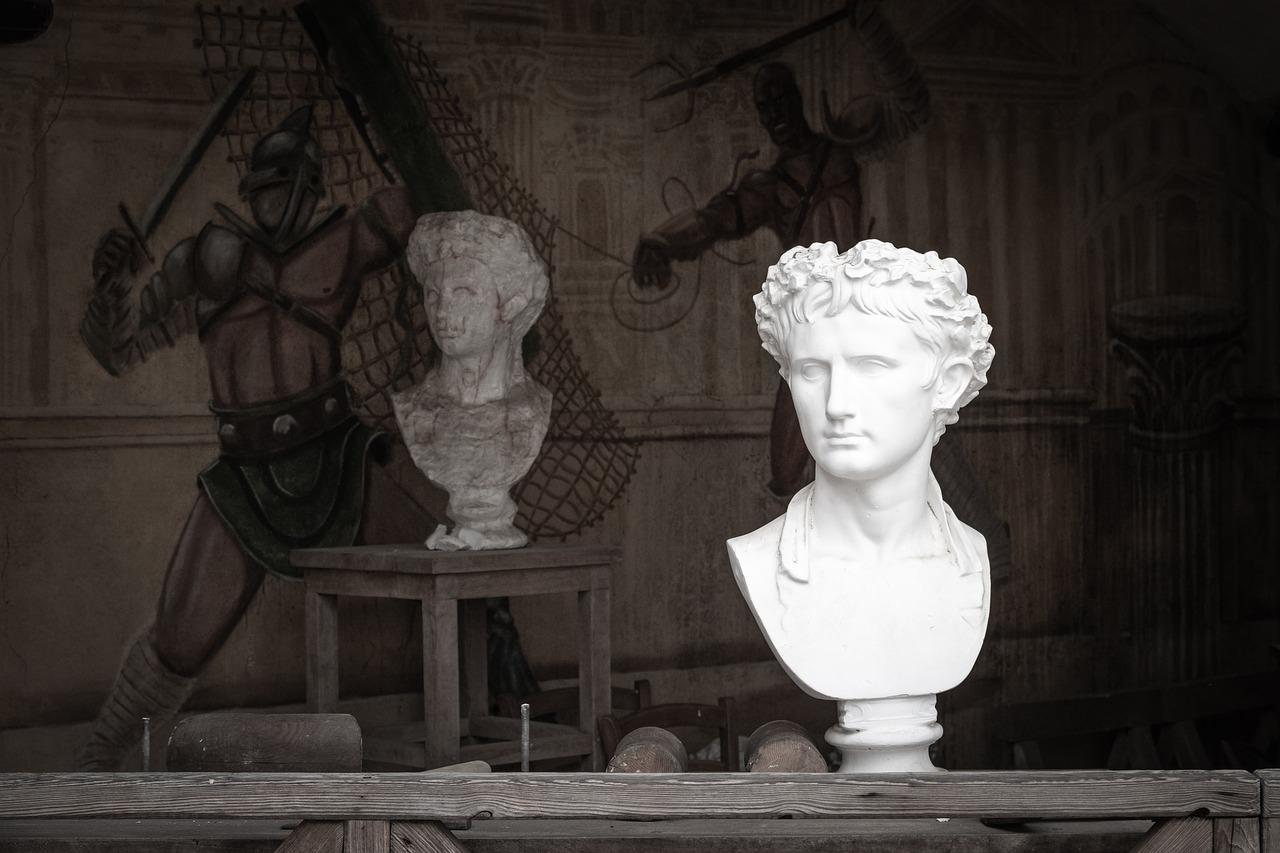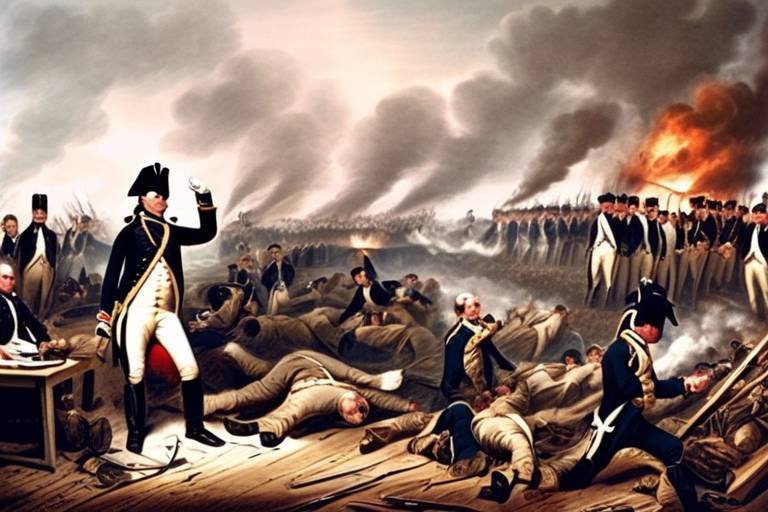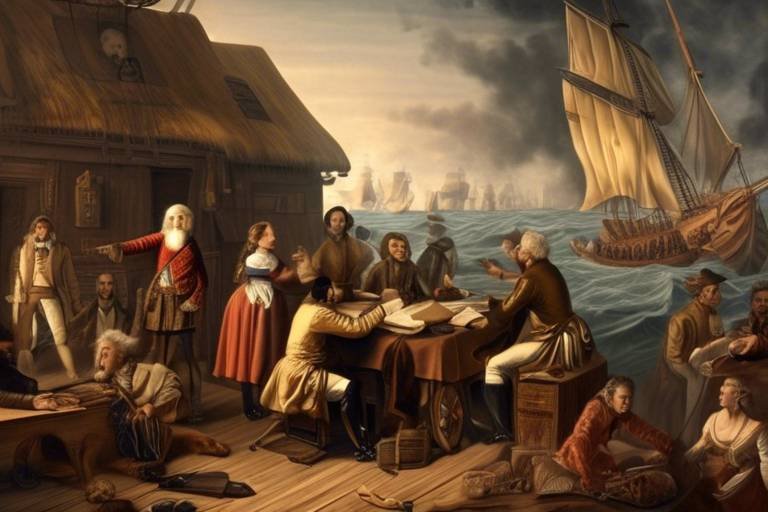The Legacy of the Enlightenment - Ideas that Shaped the World
The Enlightenment, a period of intellectual and philosophical growth in 17th and 18th-century Europe, left an indelible mark on the world we live in today. Its legacy is one of profound influence, shaping society, politics, and culture in ways that continue to resonate. The core ideas of the Enlightenment, such as reason, individualism, and progress, have not only endured but have thrived, guiding modern thought and inspiring change.
At its heart, the Enlightenment was a movement that championed the power of human reason and the belief in progress through knowledge. It was a time when thinkers dared to challenge traditional beliefs, paving the way for a new era of intellectual freedom and exploration. The legacy of the Enlightenment is a testament to the enduring impact of ideas that dared to question and reshape the world.
Key figures like Voltaire, Rousseau, and Locke were instrumental in shaping Enlightenment thought. Their writings on liberty, equality, and human rights laid the groundwork for modern democratic principles that continue to shape our societies today. Their ideas sparked a revolution in thinking, challenging the status quo and advocating for a more just and equitable world.
The Enlightenment was not confined to the realm of philosophy; it permeated every aspect of society, from government to the arts. It influenced the development of constitutional democracies, reshaped the way we view the natural world through scientific discoveries, and revolutionized cultural production and artistic movements. The legacy of the Enlightenment is a multifaceted tapestry of ideas that continue to shape our understanding of the world.
As we reflect on the legacy of the Enlightenment, we cannot overlook its global impact. The principles of the Enlightenment spread far beyond Europe, inspiring movements for independence, human rights, and social justice around the world. Today, these ideas remain relevant as we grapple with contemporary challenges and strive to create a more inclusive and equitable society.

Origins of the Enlightenment
Exploring the enduring impact of Enlightenment ideas on society, politics, and culture. How key principles such as reason, individualism, and progress continue to influence modern thought and shape the world we live in today.
Tracing the roots of the Enlightenment movement in 17th and 18th-century Europe. The intellectual, social, and political factors that paved the way for the emergence of new ideas and philosophies.
Examining the contributions of influential figures like Voltaire, Rousseau, and Locke. How their writings on liberty, equality, and human rights laid the foundation for modern democratic principles.
Exploring how Enlightenment ideals shaped the development of constitutional democracies and the concept of the social contract. The influence of these ideas on the structures and functions of modern states.
Discussing the scientific discoveries and empirical methodologies that defined the Enlightenment era. How the emphasis on reason and evidence transformed the way people viewed the natural world and human society.
Analyzing the impact of Enlightenment thinking on literature, art, and music. How the era's emphasis on individual expression, emotion, and creativity revolutionized cultural production and artistic movements.
Examining the relationship between Enlightenment thought and religious beliefs. The challenges posed to traditional religious institutions and the rise of secularism and religious tolerance as central values.
Investigating the lasting influence of Enlightenment ideas on education systems and scientific inquiry. How the emphasis on critical thinking, empiricism, and progress continues to shape academic disciplines and research practices.
Reflecting on how Enlightenment principles spread beyond Europe to influence global movements for independence, human rights, and social justice. The ongoing relevance of these ideas in addressing contemporary challenges and shaping a more inclusive world.

Key Thinkers and Philosophies
Exploring the enduring impact of Enlightenment ideas on society, politics, and culture. How key principles such as reason, individualism, and progress continue to influence modern thought and shape the world we live in today.
Tracing the roots of the Enlightenment movement in 17th and 18th-century Europe. The intellectual, social, and political factors that paved the way for the emergence of new ideas and philosophies.
Examining the contributions of influential figures like Voltaire, Rousseau, and Locke. How their writings on liberty, equality, and human rights laid the foundation for modern democratic principles.
Exploring how Enlightenment ideals shaped the development of constitutional democracies and the concept of the social contract. The influence of these ideas on the structures and functions of modern states.
Discussing the scientific discoveries and empirical methodologies that defined the Enlightenment era. How the emphasis on reason and evidence transformed the way people viewed the natural world and human society.
Analyzing the impact of Enlightenment thinking on literature, art, and music. How the era's emphasis on individual expression, emotion, and creativity revolutionized cultural production and artistic movements.
Examining the relationship between Enlightenment thought and religious beliefs. The challenges posed to traditional religious institutions and the rise of secularism and religious tolerance as central values.
Investigating the lasting influence of Enlightenment ideas on education systems and scientific inquiry. How the emphasis on critical thinking, empiricism, and progress continues to shape academic disciplines and research practices.
Reflecting on how Enlightenment principles spread beyond Europe to influence global movements for independence, human rights, and social justice. The ongoing relevance of these ideas in addressing contemporary challenges and shaping a more inclusive world.
During the Enlightenment period, key thinkers such as Voltaire, Rousseau, and Locke played pivotal roles in shaping modern ideologies. Voltaire, known for his advocacy of freedom of speech and religious tolerance, challenged the authority of the monarchy and the church. Rousseau's ideas on the social contract and the general will laid the groundwork for modern democratic governance. Locke's theories on natural rights and government by consent influenced the development of constitutional democracies. These philosophers emphasized the importance of individual rights, equality, and the pursuit of liberty, forming the cornerstone of modern democratic principles.
Stay tuned for the answers to common questions about the Enlightenment and its impact on society, politics, and culture.

Impact on Government and Governance
The during the Enlightenment era was profound, reshaping the political landscape and influencing the way societies were governed. Enlightenment ideals such as reason, liberty, and equality played a crucial role in the development of constitutional democracies and the concept of the social contract. These principles challenged the traditional notions of divine right and absolute monarchy, advocating for the rights of individuals and the accountability of rulers to their citizens.
One of the key legacies of the Enlightenment in government was the establishment of the idea that political authority should be based on the consent of the governed. This concept, popularized by thinkers like John Locke, laid the groundwork for modern democratic systems where power is derived from the people and rulers are accountable to them. The notion of a social contract between the governed and the government became a fundamental principle in shaping the relationship between citizens and the state.
Enlightenment ideas also influenced the structure and functions of modern states, promoting the separation of powers and the establishment of checks and balances to prevent the abuse of authority. The concept of limited government, where the power of rulers is constrained by laws and institutions, emerged as a safeguard against tyranny and arbitrary rule. These principles were enshrined in the founding documents of many nations, setting the stage for the development of democratic governance.
Moreover, the Enlightenment emphasis on individual rights and freedoms laid the foundation for the protection of civil liberties and the promotion of equality before the law. Concepts such as the rule of law, due process, and the protection of property rights became central tenets of modern legal systems, ensuring that individuals are treated fairly and justly by the government. The idea of government as a servant of the people, tasked with upholding the common good and respecting the rights of all citizens, became ingrained in political philosophy.
In summary, the Enlightenment had a lasting impact on government and governance by promoting principles of reason, liberty, and accountability that continue to shape political systems around the world. The legacy of the Enlightenment in governance serves as a reminder of the power of ideas to transform societies and establish the foundations of just and equitable governance.

Scientific Revolution and Rationalism
The marked a pivotal moment in human history, challenging traditional beliefs and paving the way for a new era of scientific inquiry and reasoning. During this period, groundbreaking discoveries and advancements in fields such as astronomy, physics, and biology revolutionized the way people understood the natural world.
At the heart of the Scientific Revolution was the emphasis on reason and evidence-based inquiry, shifting away from reliance on authority and superstition. Visionaries like Galileo Galilei and Isaac Newton championed empirical observation and experimentation, laying the foundation for modern scientific methodology.
One of the key tenets of this intellectual movement was the promotion of rationalism, the idea that knowledge should be derived from reason and logic rather than tradition or faith. This shift towards critical thinking and skepticism fueled a wave of innovation and discovery that continues to shape our understanding of the universe.
The Scientific Revolution not only transformed the field of science but also challenged societal norms and beliefs. It encouraged individuals to question established dogmas and seek answers through observation and analysis, leading to profound shifts in thinking across various disciplines.
As a result of the Scientific Revolution and the rise of rationalism, new avenues of exploration opened up, sparking a wave of curiosity and discovery that propelled humanity into a new age of enlightenment and understanding. The legacy of this era continues to inspire scientists, thinkers, and innovators to push the boundaries of knowledge and explore the mysteries of the universe.

Enlightenment and the Arts
During the Enlightenment period, the influence of new ideas extended beyond the realms of politics and science to profoundly impact the arts. Artists, writers, and musicians of the era were inspired by the core principles of individualism, reason, and emotion, leading to a transformation in cultural production and artistic expression.
The Enlightenment encouraged a shift towards valuing individual creativity and expression in the arts. Artists began to focus on portraying human emotions and experiences, moving away from the rigid constraints of traditional forms and themes. This emphasis on individuality and emotion gave rise to new artistic movements that celebrated the unique perspectives of each creator.
One of the key aspects of Enlightenment thinking that influenced the arts was the belief in the power of reason and rationality. Artists sought to depict the world in a more realistic and truthful manner, drawing inspiration from scientific discoveries and empirical observation. This emphasis on rationalism led to a greater focus on precision, detail, and accuracy in artistic representation.
Enlightenment ideas also played a significant role in shaping the themes and subjects explored in literature, art, and music. Artists began to engage with philosophical concepts such as liberty, equality, and human rights, using their creative works to critique social injustices and advocate for reform. This infusion of intellectual thought into artistic expression gave rise to works that not only entertained but also provoked thought and reflection.
Moreover, the Enlightenment fostered a spirit of experimentation and innovation in the arts. Artists pushed boundaries, challenging traditional norms and conventions to explore new forms of expression. This spirit of creativity and exploration laid the groundwork for future artistic movements, influencing the development of modern art and culture.

Enlightenment and Religion
During the Enlightenment period, there was a significant shift in the relationship between **religion** and **reason**. The Enlightenment thinkers questioned traditional religious beliefs and sought to reconcile faith with rationality. They challenged the authority of religious institutions and emphasized the importance of **individual conscience** and **freedom of thought**.
**Secularism** emerged as a central value, advocating for the separation of **church and state** and promoting **religious tolerance**. This era saw the rise of **Deism**, a belief in a **rational and impersonal** **God**, rejecting **dogma** and **supernatural** elements of traditional religions.
Enlightenment ideas also sparked debates on **religious freedom** and **the role of religion in society**. **Voltaire** famously criticized religious **intolerance** and **superstition**, advocating for a more **tolerant** and **enlightened** approach to faith.
Overall, the Enlightenment challenged **traditional religious authority** and paved the way for the **secularization** of society. It encouraged **critical thinking** and **open dialogue** on matters of **faith** and **belief**, leaving a lasting impact on how religion is viewed in the modern world.

Legacy in Education and Science
The legacy of the Enlightenment in education and science is profound, shaping the way we approach learning and knowledge acquisition. During this intellectual movement, the emphasis on critical thinking and empiricism revolutionized educational systems, paving the way for modern academic disciplines.
Enlightenment thinkers believed in the power of reason and evidence, advocating for the use of logic and observation in scientific inquiry. This shift in perspective laid the foundation for the scientific revolution, leading to groundbreaking discoveries and advancements in various fields.
One of the key legacies of the Enlightenment in education is the promotion of universal education and the democratization of knowledge. The idea that education should be accessible to all, regardless of social status, has had a lasting impact on educational policies and practices.
Moreover, the Enlightenment's emphasis on progress and innovation continues to drive scientific research and technological development today. The belief in the potential for continuous improvement and the pursuit of knowledge for the betterment of society are core principles that stem from Enlightenment thinking.
In the realm of science, the legacy of the Enlightenment is evident in the scientific method, which emphasizes systematic observation, experimentation, and the formulation of hypotheses. These principles have become fundamental to the practice of science and have led to significant advancements in various scientific disciplines.
Overall, the legacy of the Enlightenment in education and science underscores the enduring impact of rational thought and empirical inquiry on human progress and intellectual development. By embracing the values of critical thinking, evidence-based reasoning, and continuous learning, we honor the legacy of the Enlightenment thinkers who paved the way for modern education and scientific exploration.

Enlightenment and Global Impact
The Enlightenment era was not confined to the borders of Europe; its influence spread far and wide, leaving an indelible mark on global history. As the ideas of reason, individual rights, and progress gained traction, they sparked movements for independence, human rights, and social justice across continents. From the American Revolution to anti-colonial struggles in Asia and Africa, the Enlightenment provided a philosophical foundation for challenging oppressive systems and advocating for equality and liberty.
One of the key aspects of the Enlightenment's global impact was its role in shaping the concept of universal human rights. The notion that all individuals are entitled to certain fundamental rights by virtue of their humanity gained prominence during this period and continues to be a driving force in international law and advocacy efforts today. The Enlightenment's emphasis on the inherent dignity and worth of every person laid the groundwork for modern human rights frameworks and inspired generations of activists to fight for justice and equality.
Moreover, the Enlightenment's promotion of rational inquiry and scientific progress had profound implications for the development of global knowledge networks. As thinkers and scholars exchanged ideas across borders, new discoveries and innovations emerged, fueling advancements in various fields from technology to medicine. The spirit of intellectual curiosity and collaboration that characterized the Enlightenment era continues to shape our interconnected world, driving innovation and cross-cultural exchange.
While the Enlightenment originated in Europe, its principles transcended geographical boundaries, resonating with individuals and communities around the world. The legacy of the Enlightenment in promoting freedom, equality, and human dignity remains a powerful force in contemporary struggles for social justice and inclusive governance. By recognizing the enduring impact of Enlightenment ideas on a global scale, we can appreciate the interconnectedness of human history and the ongoing relevance of striving for a more enlightened and equitable world.
Frequently Asked Questions
- What was the Enlightenment period?
The Enlightenment period, also known as the Age of Enlightenment, was an intellectual and cultural movement that emerged in Europe during the late 17th and 18th centuries. It was characterized by a focus on reason, science, individualism, and skepticism of traditional authority. This period marked a shift towards valuing human reason and empirical evidence over religious dogma and superstition.
- Who were some key figures of the Enlightenment?
Some key figures of the Enlightenment include philosophers such as Voltaire, Jean-Jacques Rousseau, and John Locke. These thinkers advocated for concepts such as liberty, equality, and human rights, which laid the groundwork for modern democratic principles and influenced the development of constitutional democracies.
- What impact did the Enlightenment have on society?
The Enlightenment had a profound impact on society by promoting concepts such as individual rights, freedom of thought, and the separation of church and state. It paved the way for the development of modern democratic governments, scientific advancements, and the rise of secularism. The ideas of the Enlightenment continue to shape our understanding of politics, culture, and human rights today.
- How did the Enlightenment influence art and literature?
The Enlightenment influenced art and literature by emphasizing individual expression, emotional depth, and creativity. Artists and writers during this period sought to challenge traditional norms and conventions, leading to the emergence of new artistic movements and literary styles. The focus on reason and human experience in the Enlightenment era revolutionized cultural production and shaped the arts for centuries to come.



















